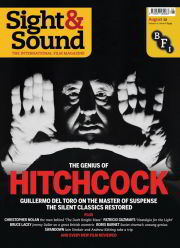 As you may well have heard by now, Sight & Sound’s latest list of greatest films of all time is out now. Released once every ten years, the poll is one of the most respected in the industry and comes in two flavours: the critics’ poll and the directors’ poll.
As you may well have heard by now, Sight & Sound’s latest list of greatest films of all time is out now. Released once every ten years, the poll is one of the most respected in the industry and comes in two flavours: the critics’ poll and the directors’ poll.
This year, 846 critics (and programmers, academics and distributors) as well as 358 directors voted for what they think are the greatest cinematic works of all time. What has grabbed headlines these past few days is the fact that for the first time since the 1962 poll, Citizen Kane is no longer at the top of either the critics’ poll or the directors’ one. Instead, critics have chosen Hitchcock’s Vertigo, while directors have named Ozu’s Tokyo Story as the greatest film of all time.
The highest ranked Kurosawa film on the main list is Seven Samurai, sitting at number 17 with Bergman’s Persona, and six places down from the 2002 results. The other Kurosawa film in the top 50 is Rashomon, which shares place 26 with Tarkovsky’s Andrei Rublev, and has dropped from 13th in 2002.
A similar slip has happened in the directors’ poll, where both Seven Samurai and Rashomon have traditionally been in the top 10 (both were 10th in 1992 and both were 9th in 2002). This year, they have dropped out, but how far remains uncertain. The full poll results will be published in mid-August.
[Mid-August edit: the directors’ top 100 has been published and Seven Samurai is #17, while Rashomon immediately follows it at #18.]
While lists like these are obviously a little silly, they do communicate something about the changing nature of “the canon”. For us, the interesting (and maybe a little disappointing) thing to note is that, at least on some level, the appreciation of Kurosawa has dropped somewhat (relatively speaking) from what it was in 1992 when he was, arguably, enjoying the highest level of recognition in his career, and again in 2002, at which point his death was still a fairly recent event.
It is also true, of course, that many directors and critics who were directly influenced by Kurosawa have since 2002 passed away themselves, and are therefore unable to take part in the poll any longer. This is what makes Sight and Sound’s one-in-a-decade system interesting, and it will be fascinating to see how Kurosawa ranks in 2022, and then again in 2032. Will his films slip down even further as even more people directly influenced by him pass away, or will there be a resurgence from a new generation that have discovered him again?
You will, of course, hear all about it here at akirakurosawa.info. Stay tuned!






Kurosawa did place in Coppola and Woody Allen’s lists: http://blogs.indiewire.com/theplaylist/read-new-all-time-top-10s-from-martin-scorsese-woody-allen-francis-ford-coppola-quentin-tarantino-more-20120803
Coppola listed Yojimbo and The Bad Sleep Well while Allen went with Rashomon.